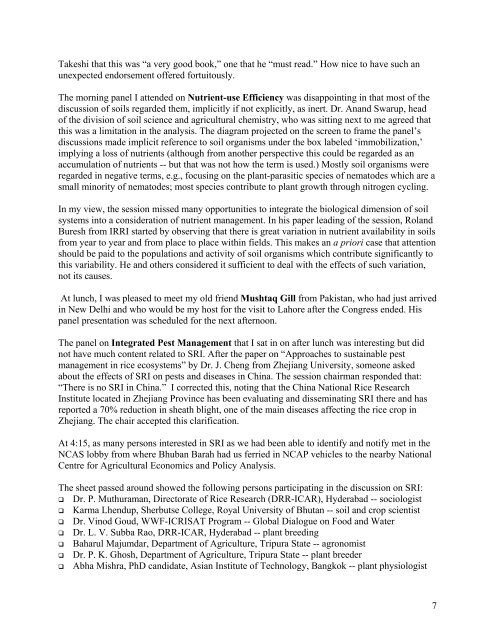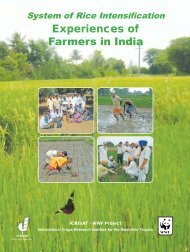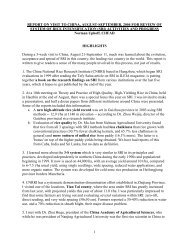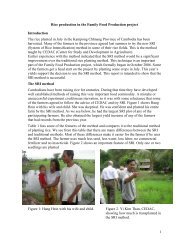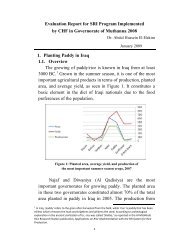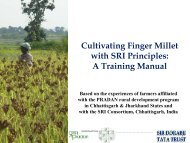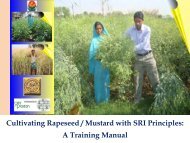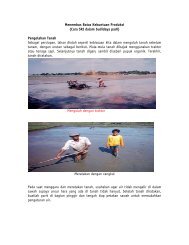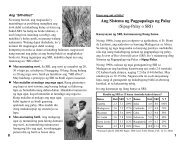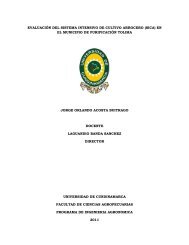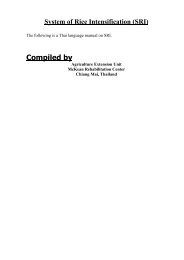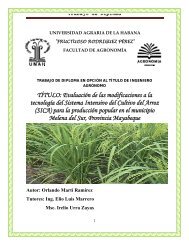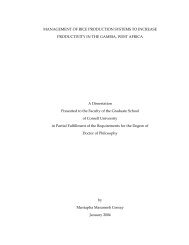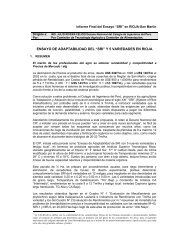REPORT FROM 2ND INTERNATIONAL RICE CONGRESS, NEW ...
REPORT FROM 2ND INTERNATIONAL RICE CONGRESS, NEW ...
REPORT FROM 2ND INTERNATIONAL RICE CONGRESS, NEW ...
Create successful ePaper yourself
Turn your PDF publications into a flip-book with our unique Google optimized e-Paper software.
Takeshi that this was “a very good book,” one that he “must read.” How nice to have such an<br />
unexpected endorsement offered fortuitously.<br />
The morning panel I attended on Nutrient-use Efficiency was disappointing in that most of the<br />
discussion of soils regarded them, implicitly if not explicitly, as inert. Dr. Anand Swarup, head<br />
of the division of soil science and agricultural chemistry, who was sitting next to me agreed that<br />
this was a limitation in the analysis. The diagram projected on the screen to frame the panel’s<br />
discussions made implicit reference to soil organisms under the box labeled ‘immobilization,’<br />
implying a loss of nutrients (although from another perspective this could be regarded as an<br />
accumulation of nutrients -- but that was not how the term is used.) Mostly soil organisms were<br />
regarded in negative terms, e.g., focusing on the plant-parasitic species of nematodes which are a<br />
small minority of nematodes; most species contribute to plant growth through nitrogen cycling.<br />
In my view, the session missed many opportunities to integrate the biological dimension of soil<br />
systems into a consideration of nutrient management. In his paper leading of the session, Roland<br />
Buresh from IRRI started by observing that there is great variation in nutrient availability in soils<br />
from year to year and from place to place within fields. This makes an a priori case that attention<br />
should be paid to the populations and activity of soil organisms which contribute significantly to<br />
this variability. He and others considered it sufficient to deal with the effects of such variation,<br />
not its causes.<br />
At lunch, I was pleased to meet my old friend Mushtaq Gill from Pakistan, who had just arrived<br />
in New Delhi and who would be my host for the visit to Lahore after the Congress ended. His<br />
panel presentation was scheduled for the next afternoon.<br />
The panel on Integrated Pest Management that I sat in on after lunch was interesting but did<br />
not have much content related to SRI. After the paper on “Approaches to sustainable pest<br />
management in rice ecosystems” by Dr. J. Cheng from Zhejiang University, someone asked<br />
about the effects of SRI on pests and diseases in China. The session chairman responded that:<br />
“There is no SRI in China.” I corrected this, noting that the China National Rice Research<br />
Institute located in Zhejiang Province has been evaluating and disseminating SRI there and has<br />
reported a 70% reduction in sheath blight, one of the main diseases affecting the rice crop in<br />
Zhejiang. The chair accepted this clarification.<br />
At 4:15, as many persons interested in SRI as we had been able to identify and notify met in the<br />
NCAS lobby from where Bhuban Barah had us ferried in NCAP vehicles to the nearby National<br />
Centre for Agricultural Economics and Policy Analysis.<br />
The sheet passed around showed the following persons participating in the discussion on SRI:<br />
Dr. P. Muthuraman, Directorate of Rice Research (DRR-ICAR), Hyderabad -- sociologist<br />
Karma Lhendup, Sherbutse College, Royal University of Bhutan -- soil and crop scientist<br />
Dr. Vinod Goud, WWF-ICRISAT Program -- Global Dialogue on Food and Water<br />
Dr. L. V. Subba Rao, DRR-ICAR, Hyderabad -- plant breeding<br />
Baharul Majumdar, Department of Agriculture, Tripura State -- agronomist<br />
Dr. P. K. Ghosh, Department of Agriculture, Tripura State -- plant breeder<br />
Abha Mishra, PhD candidate, Asian Institute of Technology, Bangkok -- plant physiologist<br />
7


